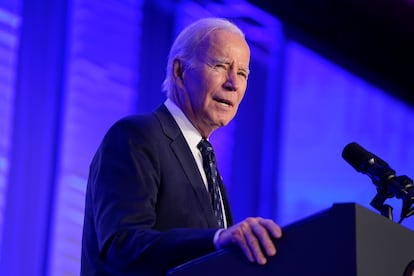Budget highlights Biden’s ‘values’ as he eyes 2024 campaign
Here are the highlights of the president’s plan. Many of the key proposals are designed to draw sharp contrasts with Republicans

With Republicans in control of the House, there’s no chance that President Joe Biden’s new budget plan will become law as it stands. Instead, the financial blueprint that he’s announcing in Philadelphia on Thursday will serve as a political talking point for a president preparing to run for reelection.
“When you look at the budget, it’s a statement of the president’s values,” White House press secretary Karine Jean-Pierre said. Many of the key proposals are designed to draw sharp contrasts with Republicans.
Here are of the highlights of Biden’s plan.
The top line
Biden’s budget covers the next 10 years. Overall, he expects an additional $4.7 trillion in tax revenues and $800 billion in savings from making changes to government programs. Biden also wants $2.6 trillion in new spending. That leaves him with an estimated $2.9 trillion reduction in the deficit.
The president emphasized fiscal responsibility as he prepared his budget, portraying Republicans as not being serious about getting the country’s finances in order. Republicans have said Biden’s plan doesn’t go far enough, but they haven’t released proposals of their own.
Higher taxes
Biden frequently talks about making companies and the wealthy “pay their fair share,” and the budget is designed to further that goal.
The president wants a 25% tax on the richest 0.01% of Americans. The White House calls this a “minimum tax on billionaires.” The idea is designed to extract more revenue from income that isn’t derived from salaries, ending what the administration describes as “special treatment” and “giant loopholes.”
Biden also wants to roll back tax breaks enacted under his predecessor, former President Donald Trump. For example, people making more than $400,000 a year would once again face a top tax rate of 39.6%.
The budget proposal would also close the “carried interest” loophole that allows wealthy hedge fund managers and others to pay their taxes at a lower rate.
Medicare
A key trust fund that funds Medicare, which provides health care to older adults, is on track to become insolvent in about five years, meaning it would be unable to fully cover the cost of benefits. The White House says Biden’s plan would push that date back to the 2050s.
Some of the money would come from expanding the federal government’s ability to negotiate the cost of prescription drugs, something that began with the Inflation Reduction Act that Biden signed last year. He also wants to increase the Medicare tax rate from 3.8% to 5% on income exceeding $400,000 per year, including salaries and capital gains.
Biden has frequently targeted Republicans over their proposals to reduce Medicare benefits or force Congress to reauthorize the program. (Social Security is similarly being threatened by Republicans, Biden often says.) So expect to hear more from the White House on how the president’s plan would help older Americans.
Child tax credit
Congress expanded the child tax credit during the pandemic to help families cope with the economic fallout, but the extra money expired last year.
Now Biden wants to restore the credit to its previous level. The change would provide families up to $3,600 per child, up from $2,000. The credit would be “fully refundable,” which means households could receive all of the money even if they don’t owe any taxes. That approach is designed to make sure the credit benefits low-income families.
Cancer research
Biden made fighting cancer part of the “unity agenda” that he outlined near the beginning of his administration, and he wants $2.8 billion to advance that goal.
He’s described the effort as a “cancer moonshot” that should become a “national purpose” for Americans. It’s a personal issue for Biden. His eldest son, Beau, died from a brain tumor. In addition, the president and first lady Jill Biden both recently had lesions removed that contained basal cell carcinoma, a kind of skin cancer.
Biden wants to reduce cancer death rates in half over the next quarter-century.
Eyes on China
Some of the budget is designed to help Biden’s effort to steer US foreign policy to confront China’s rising influence.
The Pentagon would receive $842 billion, which includes money to modernize the US nuclear arsenal. There’s also a proposed 5.2% proposed pay increase for troops, designed to help the military boost its lagging recruitment.
In addition, the budget would allocate $7.1 billion to renew agreements with three Pacific Island nations that the Chinese have been wooing. The amount includes $6.5 billion over 20 years to the Marshall Islands, Micronesia and Palau, plus an additional $634 million to maintain US Postal Service operations there.
Under “Compact of Free Association” agreements with the three, the US provides the islands with an array of services that range from weather forecasting to disaster management, air traffic control and mail delivery.
Sign up for our weekly newsletter to get more English-language news coverage from EL PAÍS USA Edition
Tu suscripción se está usando en otro dispositivo
¿Quieres añadir otro usuario a tu suscripción?
Si continúas leyendo en este dispositivo, no se podrá leer en el otro.
FlechaTu suscripción se está usando en otro dispositivo y solo puedes acceder a EL PAÍS desde un dispositivo a la vez.
Si quieres compartir tu cuenta, cambia tu suscripción a la modalidad Premium, así podrás añadir otro usuario. Cada uno accederá con su propia cuenta de email, lo que os permitirá personalizar vuestra experiencia en EL PAÍS.
¿Tienes una suscripción de empresa? Accede aquí para contratar más cuentas.
En el caso de no saber quién está usando tu cuenta, te recomendamos cambiar tu contraseña aquí.
Si decides continuar compartiendo tu cuenta, este mensaje se mostrará en tu dispositivo y en el de la otra persona que está usando tu cuenta de forma indefinida, afectando a tu experiencia de lectura. Puedes consultar aquí los términos y condiciones de la suscripción digital.








































